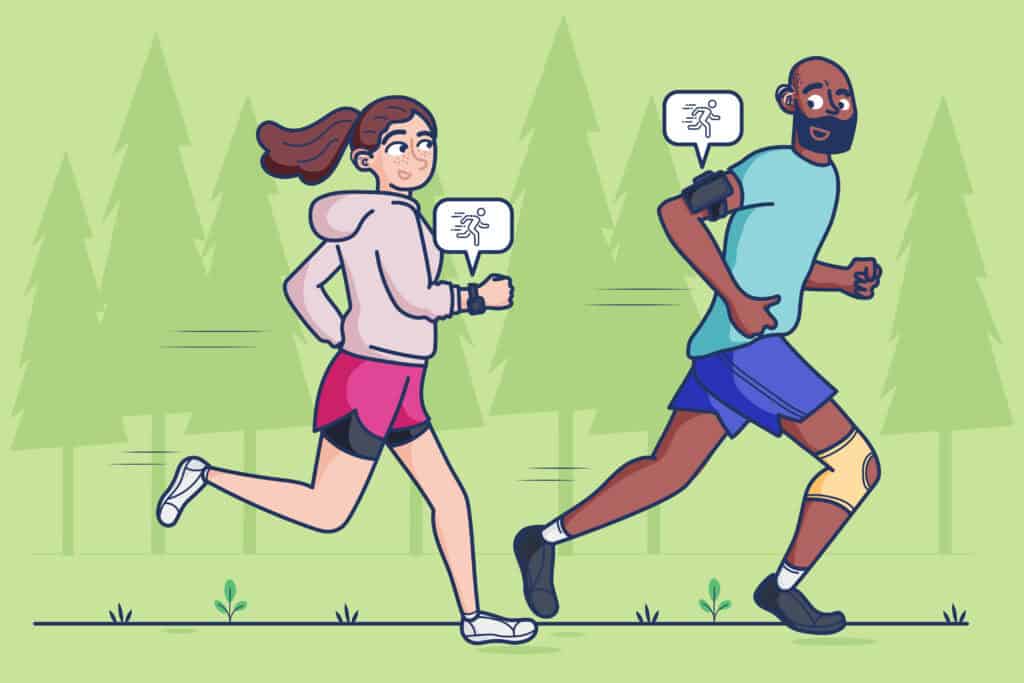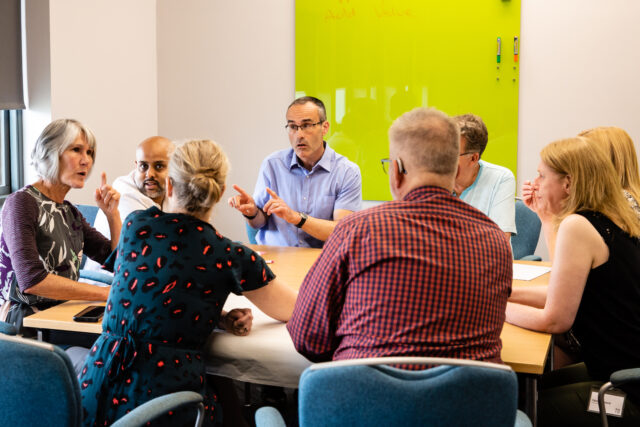RNID was approached to support Zoonou and the Department of Health and Social Care (DHSC) to help make the popular running app, NHS Couch to 5K, more inclusive and accessible for people who are deaf, have hearing loss or tinnitus.

Zoonou is a specialist Accessibility testing company and has been working with DHSC since 2021 to help improve the accessibility of the app by auditing its conformance to the international digital accessibility standard, Web Content Accessibility Guidelines (WCAG) 2.1 AA.
The NHS Couch to 5K app is audio-based, which presents a challenge for the inclusion of people with different levels of hearing. The project was set up to understand and address the unique needs and barriers our communities face while using NHS Couch to 5K or similar fitness apps.
RNID invited our communities to help DHSC (Department for Health and Social Care) build an app that makes a positive impact on the lives of runners who are deaf, have hearing loss and tinnitus.
What we did
We helped Zoonou and DHSC to meet the various challenges in ensuring accessibility for people who are deaf, have hearing loss or tinnitus in product development.
Accessibility in relation to hearing loss, deafness or tinnitus tends to require specialist technical input and a more qualitative approach to research and testing. This can’t be easily automated, and there aren’t existing standards to work to.
Additionally, technical accessibility audits typically only cover the Web Content Accessibility Guidelines and how people may use assistive technologies to support digital access. This often includes software, like screen readers and physical navigational tools, like joysticks. These audits don’t usually include the use of assistive tech that’s not linked to or embedded in a device, such as the hearing aids or cochlear implants worn by some of RNID’s communities.
To help, our in-house technology advisor undertook a specialist audit of the NHS Couch to 5K app and gave guidance on best practice technical interventions. Then, RNID’s multi-disciplinary user-centred design team conducted research with people who have lived experience of hearing loss, deafness, and tinnitus. This research was synthesised with the audit outputs to produce actionable insights, user needs and recommendations that DHSC could use for further product development.
Bespoke research with people who are deaf, have hearing loss, or tinnitus
RNID’s Research Panel is made up of over 1,200 people, who have lived experience of hearing loss, deafness and/or tinnitus. They take part in various research opportunities to support our cause, from social inclusion and campaigning the Government, to tech and product development.
By working with our Research Panel, we identified the members who had experience in using Couch to 5K and other fitness apps, or were potential new product users. Initial screening gave us data to ensure a range of people were engaged and aligned against the demographics of current app users. We then used a combination of surveys, unmoderated usability testing, and qualitative interviews with the same participants, which allowed them to test out the app in real time and feedback their experience and recommendations.
The team at RNID structured this research to understand:
- how different target groups interact with the product
- how people who are deaf, have hearing loss or tinnitus adapt their use of the app to make it more accessible for them
- which features of the product are challenging and why
- why some people had stopped using the app.
From this research we gathered ideas and suggestions from our community on how the Couch to 5k app’s accessibility features could be improved. This, along with feedback from our Technology Lead, the team at DHSC, and other users, helped us to distinguish which ideas were viable, which needed refining, and which would have the highest potential impact.
The ongoing dialogue with RNID’s community throughout the project enabled us to make confident recommendations to DHSC’s development team. Some of the participants also expressed interest in testing the product again, once improvements have been made.
What we achieved
Through the collaboration with RNID, Zoonou and DHSC were better able to understand how best to approach accessibility in product development for people who are deaf, have hearing loss or tinnitus, and test their products and new concepts with people who have lived experience. Altogether, this consultation with RNID has informed a further phase of product development for DHSC, which is now underway.
The same members of our research panel have signed up to support the further development of the app, to see what recommendations have been met and what future potential improvements might be made. As a result, the product will continue to become more accessible and inclusive for people who are deaf, have hearing loss or tinnitus.
William Bunch, Head of Accessibility at Zoonou, said:
“Working with charities like the RNID helps further our understanding of the challenges that users like people who are deaf, have hearing loss or tinnitus encounter in the digital world. This knowledge enables us to guide our clients on considerations beyond meeting WCAG compliance through additional testing focused on real user experiences or consultancy from specialist organisations.”
Jimmy Carnie, Digital Product Lead at DHSC, said:
“RNID were our ideal partner to deliver this discovery research to help us prioritise, support and improve the NHS Couch to 5K app experience for those who are deaf, have hearing loss and tinnitus. We look forward to continuing this partnership in the future and helping more audiences move more and build healthier and more active lives.”
Want to make your products or services more accessible?
